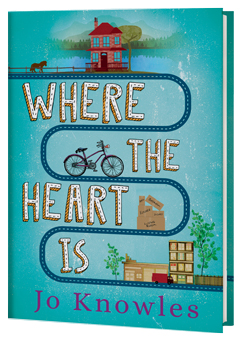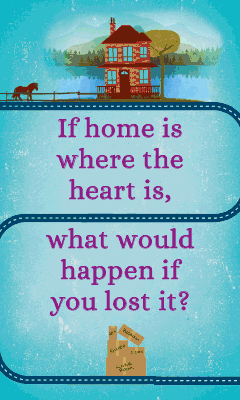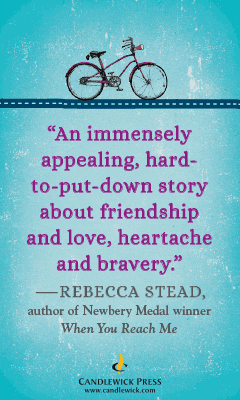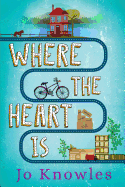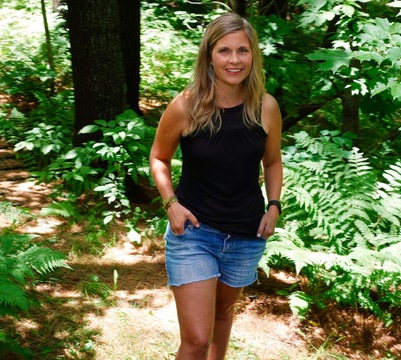Where the Heart Is
by Jo Knowles
With author Jo Knowles, readers always know where the heart will be: at the very center of her books. Truly bittersweet, Where the Heart Is features Rachel Gartner, a 13-year-old with some extremely relatable issues. Knowles gracefully captures that sliver of time when a young person sits at the cusp of adolescence but is still, occasionally, very much a child. She skillfully leads readers through the full span of Rachel's emotions as she navigates family, love and loss.
The summer she turns 13, Rachel gets an animal caretaking job. Her new neighbors, who recently built a fancy house on the land she and best friend Micah grew up playing on and sledding down, are hobbyist farmers. Rachel is sad about losing her beloved hills and fields, but tries to be philosophical about the job. After all, tending to horses, pigs, chickens and a sweet young steer named Ferdinand is not the worst way to make some money. Much-needed money, she thinks, since her parents are fighting more intensely than ever before, always about finances. In the past, she would have turned to Micah for support, but the friendship feels different lately. They "have always been perfect friends. Always, except for when he wanted to be more than that." Rachel wishes she felt "that way" about Micah, but she doesn't. In fact, she's realizing she's never been interested in a boy, and she has an uneasy feeling about what that might mean. Even though she's discovering it does feel nice to be close to her friend Cybil, Rachel tells her, "I feel like I'm too young to know who I'm attracted to."
Rachel's friendship with Micah, though strained at times, endures, in part because of their remarkable openness with each other. Micah has no qualms about telling Rachel when she's being weird and Rachel manages to admit that she feels jealous when Micah pays attention to other girls even though, as he says, "I thought you didn't want to be more than--never mind. You're really confusing me, Rachel." Even in the most delicate conversations, the two are heart-wrenchingly honest, as when Rachel says to Micah, "I know this is your way of helping me 'come out' or whatever, but I'm not ready to do that. At least not officially. I just want to get used to feeling how I feel. I don't want a label on me. Not yet."
In addition to all these confusing feelings, Rachel's charges are proving to be more challenging than she had anticipated. Lucy the pig is aggressive and stinky, although Rachel still hopes she can save her from her destiny as bacon for her owners. The hens peck at Rachel's ankles and pick on the smallest, scruffiest among them. And Ferdinand is cute but slimes her with his saliva. Luckily, her own beloved old rescue pony, Rainbow, remains a steadfast friend at home, even if he can't do much more than allow Rachel's eight-year-old sister, Ivy, to sit on him while Rachel reads aloud to them. Meanwhile, Rachel's parents need to work more so she has to let Ivy tag along with her, and Rachel's friends at the beach only seem to care about who's an "item" and when the next party is. Too much is changing, too fast. "Now it's clear who the girls are and who the boy is and we're not just a bunch of friends--we're potential 'interests,' " Rachel thinks. "And having fun and fooling around isn't just playing anymore--it's flirting. And I don't want it to be. I don't want it all to change." Bigger changes are coming, too, and at a time when Rachel is simply trying to find her place in her own small part of the world, she learns even the safest place of all may not be everlasting.
Although it's devastating to discover that her parents are flawed and can't save the family from all the stumbling blocks life sets in front of them, it's also comforting to know the love they all share is abiding and their resourcefulness and heart will carry them through--even if not in the way Rachel might hope. For any reader who has felt torn from one day to the next--or one minute to another--between the security of childhood and the confusing allure of adolescence, Rachel will be a friend. She finds no easy answers to her many questions during this summer of transition, and readers will likely identify with both her frustration and her eventual acceptance of a certain amount of ambiguity in life. Children who like "real" stories about "real" kids will adore this quiet, elegant novel. --Emilie Coulter



